- Home
- Amanda Flower
Death and Daisies
Death and Daisies Read online
Death and Daisies
A MAGIC GARDEN MYSTERY
Amanda Flower
Dedication to
Reepicheep & Mister Tumnus
“I am sure there is Magic in everything, only we have not sense enough to get hold of it and make it do things for us.”
—Frances Hodgson Burnett, The Secret Garden
Acknowledgments
I have always thought that gardens and flowers hold a little bit of mystery and magic. Like Fiona, I am my happiest and most at peace when I am in my garden. It has been my joy to bring flowers, magic, and mystery together in the Magic Garden Mysteries, and I am so grateful to my dear readers who make every one of my stories possible. It would be impossible to do what I do without you.
Even though I have written these stories, they weren’t published alone, and I have several great people to thank for making the magic garden possible. First, as always, thank you to my super-agent Nicole Resciniti for her unfailing support and friendship. Thank you also to the team at Crooked Lane Books, especially to my editors Anne Brewer and Marla Daniels.
Thanks also to flower arranger Helen Grannetino for giving me a lesson in making beautiful bouquets and arrangements. Fiona Knox’s flower shop is better for it.
Thanks so much to my assistant Molly Carroll for her help with this novel and for the assistance of friends Mariellyn Grace and David Seymour. A special thanks to David for helping to plan the murder in this book.
Love, as always, to my family: Andy, Nicole, Isabella, and Andrew, for their love and encouragement.
Finally, to my Heavenly Father, thank you for flowers of all colors, shapes, sizes, and scents. The world is made richer by each one.
Chapter One
“I’m going to drop it! Help, they’re slipping!” my younger sister called.
I dropped the bunch of sunflowers I was arranging on the polished driftwood counter and ran around it.
I snatched the two boxes of vases from my sister’s arms just as she was letting them go. I knelt and gently set them down.
I looked up at her from my spot on the floor.
Her full-cheeked, heart-shaped face was red, her dark-blue eyes were wide, and wisps of feathery blonde hair stuck to her clear brow. She appeared to be bracing for impact, and I was afraid that impact might come from me.
“Isla, why on earth did you carry both those boxes at once?” I shook my head.
She tilted her head up to the white ceiling. “I’m just trying to finish. Fi, we’ve been here all day. Can’t we go home? The storm is rolling in, and I don’t want to be caught in it! You know I hate storms!” she said in a notable Tennessee accent, though nowhere near as pronounced as our mother’s.
I stood and walked to one of the large display windows at the front of the shop. Each window was five feet across on either side of the front door. Isla was right; the storm was closing in. Gray, angry clouds churned in the sky. It was time to return to my cottage at Duncreigan. I wanted to check the garden and make sure it was secure before the storm hit, and if I wanted to do that, I had to leave now. I could make the final touches to the shop tomorrow before the opening.
I moved away from the window. “I’m sorry for snapping at you. There is just a lot to do for tomorrow.”
She brushed her hair back from her face. Even when she was sweaty, my sister was beautiful. Unlike me, she was petite and had plenty of curves. She hated her curves because the fashion magazines told her to. She had the perfect hourglass figure, which I, who was tall and narrow, had always envied. She was spunky, eight years younger than me, fresh out of college, and ready to conquer the world. I didn’t so much want to conquer the world as make my profit margins for my new business, the Climbing Rose Flower Shop in Bellewick, Aberdeenshire, Scotland.
I had chosen the name Climbing Rose after the three-hundred-year-old rose growing in my garden back at Duncreigan. No, roses don’t live for three hundred years … usually. Unless magic is involved. The name was a reminder to me. The flower shop might be the place I worked, but being the “Keeper of the Garden” was my real purpose. My godfather was counting on me to do it right.
“It’s okay,” she said, and gave me her bright sunny smile, which couldn’t have been more different from the blackening sky outside. She removed her phone from the back pocket of her purposely ripped jeans and scrolled through the screen. Her rosebud mouth puckered into a frown.
“Something wrong?” I asked.
She shoved the phone back into her pocket. “No. I mean, other than the storm. I hate storms,” she said, repeating her earlier sentiment.
“I know you do,” I said gently. “Let me finish up these sunflowers, and we can leave. Everything else can wait for the morning.”
She picked up the top box of vases. “Do you want these in the workroom?”
I nodded as I gathered up the sunflowers once more.
My sister went around the counter into the workroom, and I admired my shop. It was perfect with its cool, whitewashed stone walls and wide, pegged floorboards. One wall had a refrigerated flower case full of new arrangements, much like a cake decorator would have in her shop. I hoped that many of those arrangements would sell at the opening so I could fill that case with the custom flower orders I envisioned rolling in after the shop opened.
I’d paid a local carpenter to make the sales counter out of a large piece of driftwood. It had been a splurge to have a custom-made sales desk, but I hoped this was my last place of business, and I wanted it to be exactly how I wanted it. An iPad was docked on a stand at the counter in place of a cash register. It took up so much less space than a computer, which allowed more room to show customers their flower options instead of taking them back into my workroom. I glanced behind me at the second half of the shop. Shelves lined two opposing walls and were filled with all the materials I needed to run my business: wire, brackets, cloth, burlap, and twine. In the back of the room were the flowers sitting in large water-filled buckets waiting to be arranged. I’d decided to install a half door instead of a regular door because most of the time I would be the only person in the shop, and I wanted to be able to see what was going on out front when I had to work in the back.
Isla was in the middle of the workroom messing with her phone again, frowning. I assumed she was texting with someone back home. She didn’t know many people in Aberdeenshire yet. She had been in Scotland only two weeks to the day when she showed up on my doorstep and declared she was spending the summer with me because she needed one last fun summer before she flung herself fully into adulthood. Knowing Isla, she would tell me all about the text messages later. She was a talker and made a point of letting everyone know what was on her mind, whether they wanted to or not.
The shop was better than anything I could have imagined. For ten years, I had run my own flower shop back in Nashville. I had done a good business until year eight when a chain flower shop had opened on the same street as mine. When I’d finally locked the door to my shop for the last time, I’d thought my career as a flower shop owner was over, but here I stood.
Much of my business at this point was based on hopes, dreams, and lots of hard work. I’d moved to Scotland two months ago to accept my unique inheritance from my godfather, Ian MacCallister. The bequest was unique indeed because it included a charming moorland cottage and a magical garden. The garden had been under the care of Uncle Ian’s family for centuries, and without any direct heir, he had passed the garden on to me. By my calculations, I was the twelfth Keeper of the Garden. The first Keeper had been Uncle Ian’s ancestor, Baird MacCallister.
Baird had been a merchant sailor who lived in the early 1700s. He had no love for his homeland, and he planned to leave Scotland on a shipping voyage, never to return. But
the sea had other plans. Baird’s boat took off from Aberdeen harbor as planned, but a terrible storm whipped up over the sea and he never made it past the rocky cliff of the Scottish coast. Baird’s ship was wrecked. All lives were lost expect Baird’s. The sea spared him.
As he was tossed in the raging waves, he made a promise to the sea that if she let him live, he would remain in Scotland forever and help others, though at the time he didn’t know how. He swore he would no longer be a selfish man. The sea accepted his vow and spit him onto the land. He landed at what would become Duncreigan, but at the time all that was there was the menhir, an ancient standing stone, with its yellow climbing rose wrapped tightly around it. Baird took the menhir and the rose as a sign that this was where the sea wanted him to remain, and to protect the stone and it’s rose, he built a garden around them.
In the garden, the flowers and plants flourished year-round, living off the magic of the standing stone and the sea. Over the generations, the standing stone had bestowed gifts onto the garden’s Keeper. Each gift was unique and was to be used only to help others. Hamish, my godfather’s friend and the garden’s caretaker when Uncle Ian was away, had been the one to tell me all this when I first arrived in Scotland. I wished I had heard it directly from my godfather, but I hadn’t the chance, as he, a career solider for the Royal Army, had died in combat in Afghanistan. The only explanation my godfather had left me was a letter containing a set of three garden rules. Everything else I would have to learn on my own. It had been a steep learning curve, to say the least, and I hoped that opening this flower shop with the money my godfather had left me wasn’t my first huge mistake as Keeper.
I shook these worries from my head. It was too late to second-guess now. I put the last sunflower in the vase and moved it to its spot at the end of the counter as Isla took the second box to the workroom.
I had spun on my heel to follow her when the small chime on the front door rang. Isla must have forgotten to lock the door behind her.
Pivoting back around, I prepared to tell the would-be customer that the shop wasn’t open until the next day.
My friendly shopkeeper smile melted from my face when Minister Quaid MacCullen stepped through the door. Minister MacCullen happened to be the local parish rector for the village, and he also happened to hate my guts. He vocally disapproved of the MacCallister family and their garden, and since I was now the Keeper of the garden, he disapproved of me, too.
He wore black trousers and a shirt with a clerical collar under a black woolen coat and a perpetual scowl. Around his neck was a golden medallion the size of a silver dollar with a cross overlaid with intersecting rings in the middle of it.
The last time I had seen the minister had been exactly one week before on a Sunday morning when I had made the mistake of going to church. St. Thomas’s, the parish church where Minister MacCullen was the pastor, had also been my godfather’s church. In my quest to understand my godfather better, I had decided to attend, but I had been turned away. The minister met me at the church door and said, in front of his entire congregation, that I wasn’t welcome. I had thought everyone was welcome at church, but in this case, I was not. I left without arguing with him, but the rejection and embarrassment cut deep, making me long for my church back in Nashville. Because of that whole experience, I didn’t have the faintest idea what the minister was doing in my store this evening. It seemed it was the very last place he would want to be.
“I had heard the flower shop was reopening.” He had a deep Scottish accent and spoke as if he were shouting from the pulpit.
“What can I help you with, Minister? I’m afraid we aren’t open until tomorrow. The entire village is welcome to the opening. You are welcome as well,” I managed to say with a straight face, although I hoped he wouldn’t show.
His eyes formed into narrow slits that disappeared in his wrinkled face. “I didn’t come here to see the shop. I have no interest in it.”
“Then why are you here?”
He studied a grouping of canna lilies by the front window and wrinkled his nose. “I wanted to see with my own eyes if the rumors were true and you were opening a business in my village.”
I dug my fingernails into the palm of my hand. “The village doesn’t belong to you.”
He shook his head. “That is where you’re wrong. I am the village minister. Everyone who lives in the village, whether they come to Sunday morning services or not, is a member of my flock, and I don’t want you confusing or corrupting them.”
That hurt. A lot. I had neither expected nor deserved the minister’s hostility, and while I understood that his intentions came from a good place, my Christian upbringing inspired me to look for the good in people rather than the worst. Okay, so maybe the rumors about my garden were true, and maybe my uncle hadn’t exactly done anything to dispel them and the magic surrounding Duncreigan. But corruptors of the flock we were not.
My nails dug a little deeper, and I had to stop myself from pressing so hard I broke the skin. The minister had been worried about me corrupting the village from the moment I’d arrived in Aberdeenshire. He had an old grudge against Duncreigan and the MacCallister family, since we’d tended the garden at Duncreigan for so many centuries. Even though I wasn’t a MacCallister, that grudge had been extended to me now that I had inherited the cottage and garden. There was nothing I could say that would change his mind about the MacCallisters and me, so I had stopped trying weeks ago.
But I’d never been a victim of such intense, unprovoked loathing before.
I caught sight of the top of the sheath of papers he held in his hand. In bold letters, it read, SAVE THE CHAPEL! The minister must have been out rustling up funds to conserve the village’s first church building. I pointed at the stack of fliers. “Would you like me to hang one of those in the Climbing Rose?”
He curled up his bulbous nose. “No, I would not want this cultural project to be soiled by anyone from Duncreigan.”
“Then I think it’s time for you to leave. You have satisfied your curiosity and know I have a business here in the village. If that’s all you were here to do, mission accomplished,” I said. Behind him the sky outside grew even darker. “And I think it would be best if we both went home before this storm breaks. It looks like it’s going to be a bad one.”
The minister peered over his shoulder out the window and then back at me. “It won’t be as bad as the fate you face, Fiona Knox. I can promise you that.” He opened the front door to the shop, and one of the planters toppled over by the force of the wind coming through the opening. A small amount of dirt fell from the pot.
I didn’t move to put the pot upright just yet. I was too taken aback by his words. “What do you mean by that?” I asked the minister.
He smiled at me in a Grinch Who Stole Christmas kind of way and went out the door without a word.
I grabbed the front door before it could close and held it open against the wind. “What do you mean?” I shouted at the minister’s receding back, but my words were lost in a crack of thunder that didn’t seem that far off. I had turned to go back into my shop when movement across the narrow cobblestone street caught my eye. A slender young man slid into the alleyway between two buildings, but I caught sight of him before he disappeared.
What was Seth MacGregor doing back in the village of Bellewick, and why did I find his appearance as foreboding as the minister’s threat and the oncoming storm?
Chapter Two
“Just tell me. Are we going to die?” a muffled voice asked from under the stack of blankets draped over my bed.
A streak of lightning played across the lone window in the tiny bedroom that had barely enough space for the double bed on which I perched, a large wardrobe, and one chest of drawers. Not to mention my sister’s three half-opened suitcases and my still-packed boxes. A crack of thunder so fierce it made my tooth fillings ache was almost immediately followed by another flash of light. The wind and rain pummeled the two-hundred-year-old cottage, and, if I
was being honest, it sounded like the slate roof might be torn from the rafters above us.
But I placed my hand on the lump in the middle of my bed and said with as much confidence as I could muster, “No, we are not going to die.” Because that’s what big sisters always tell their baby sisters, even if they don’t know it to be fact.
Isla wriggled under the covers as if she was finally considering coming up for some air. I knew that she had to be hot under all those blankets. But another crack of thunder came before she surfaced, and she wriggled back down into her fetal position.
I shook my head. If I hadn’t been so worried about the storm myself, I would have laughed. But I was just as frightened as my sister, just not for the same reasons. I didn’t think the storm advancing from the North Sea and over the black cliffs to the glens of Scotland would rip the cottage from the earth and toss us Wizard of Oz style into the land of Munchkins—or at least that was my hope. The cottage had been in the same place for centuries and had faced many storms just as fierce as this one, but how was the garden, my garden, faring?
I wondered because the garden was my responsibility. I was its Keeper. The Keeper of the Garden was the title my godfather, Ian MacCallister, had placed on me in his will, and tending his garden had a lot more to it than watering and weeding. It was of paramount importance that I keep the garden safe from storms that might ravage it and from people who might want to hurt it, such as the minister. His thinly veiled threat earlier that day still floated in the back of my mind. What had he meant when he’d said, “It won’t be as bad as the fate you face”? What did he have in store for me or for this place I had grown to love?
I looked out my bedroom window in the direction of my garden. I prayed that it would be all right. It was too dangerous to go out and check just then, as much as I wanted too. There was a real risk of becoming lost in the storm, and if I abandoned Isla in that way, she would never forgive me.

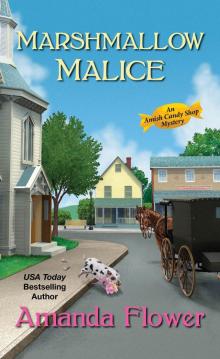 Marshmallow Malice
Marshmallow Malice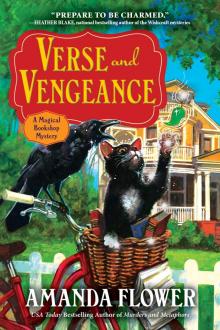 Verse and Vengeance
Verse and Vengeance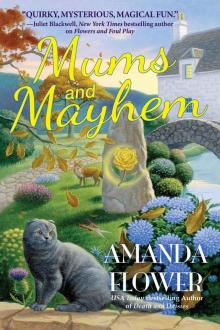 Mums and Mayhem
Mums and Mayhem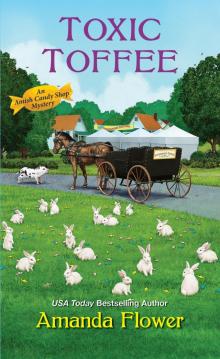 Toxic Toffee
Toxic Toffee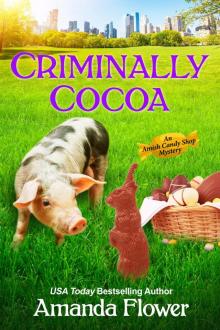 Criminally Cocoa
Criminally Cocoa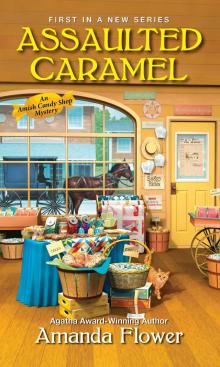 Assaulted Caramel
Assaulted Caramel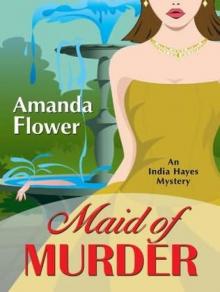 Maid of Murder aihm-1
Maid of Murder aihm-1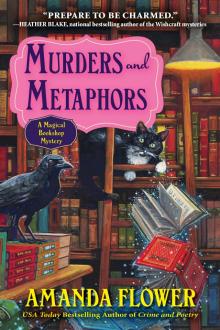 Murders and Metaphors
Murders and Metaphors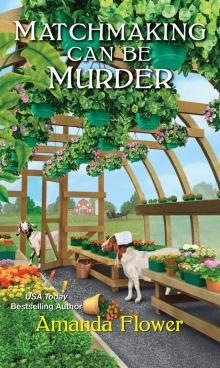 Matchmaking Can Be Murder
Matchmaking Can Be Murder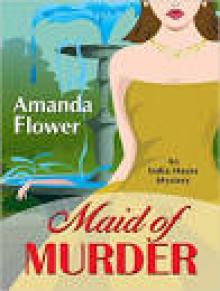 Maid of Murder (An India Hayes Mystery)
Maid of Murder (An India Hayes Mystery)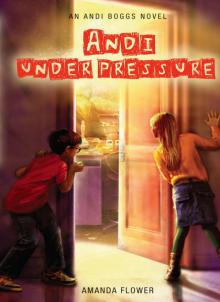 Andi Under Pressure
Andi Under Pressure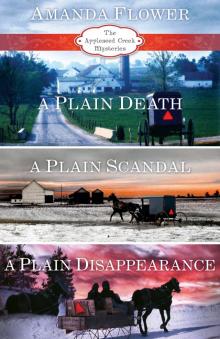 Appleseed Creek Trilogy, Books 1-3
Appleseed Creek Trilogy, Books 1-3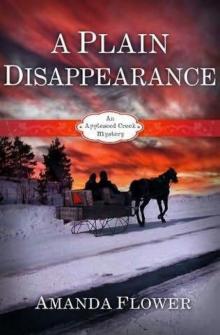 A Plain Disappearance
A Plain Disappearance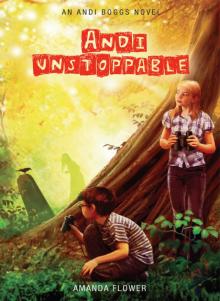 Andi Unstoppable
Andi Unstoppable The Final Vow
The Final Vow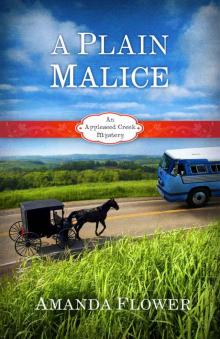 A Plain Malice: An Appleseed Creek Mystery (Appleseed Creek Mystery Series Book 4)
A Plain Malice: An Appleseed Creek Mystery (Appleseed Creek Mystery Series Book 4)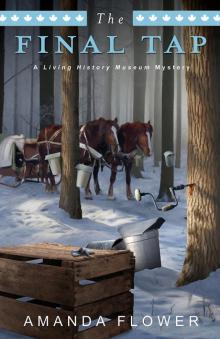 The Final Tap
The Final Tap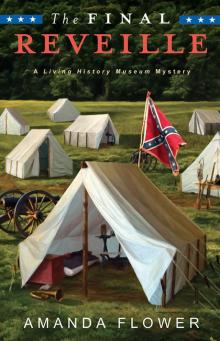 The Final Reveille: A Living History Museum Mystery
The Final Reveille: A Living History Museum Mystery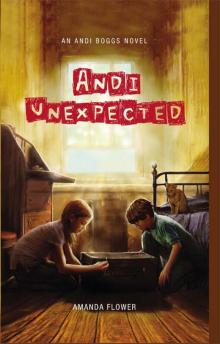 Andi Unexpected
Andi Unexpected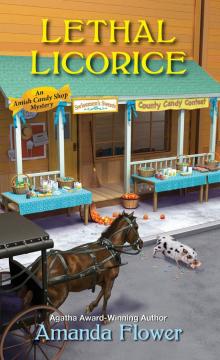 Lethal Licorice
Lethal Licorice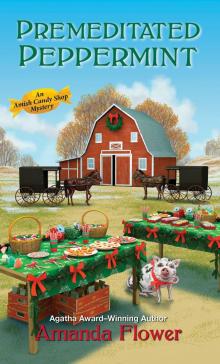 Premeditated Peppermint
Premeditated Peppermint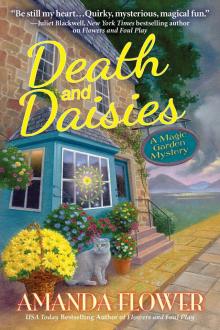 Death and Daisies
Death and Daisies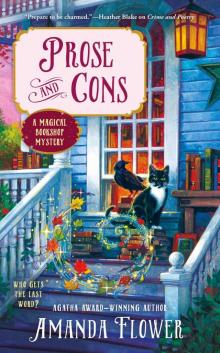 Prose and Cons
Prose and Cons